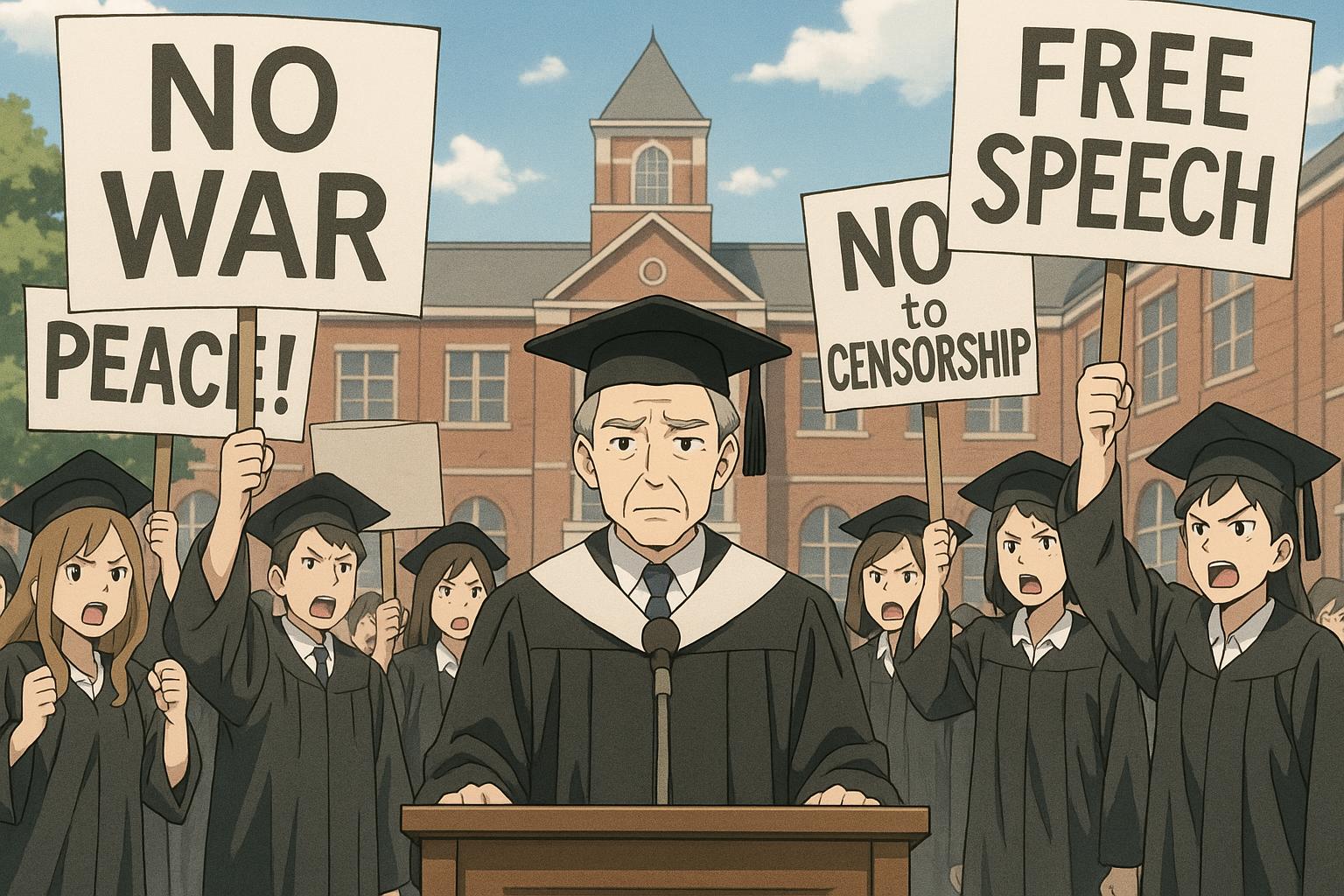The University of St Andrews is engulfed in controversy after newly elected rector Stella Maris described Israeli military actions in Gaza as “genocidal,” sparking backlash from Jewish students and raising urgent questions over free speech, institutional responsibilities, and campus safety amid escalating Middle East tensions.
The University of St Andrews has become embroiled in controversy following statements made by its newly elected rector, Stella Maris, in the wake of the escalating conflict in Gaza after the Hamas attacks on Israel on October 7, 2023. The fallout from her communications has raised significant questions regarding the delicate balance of free speech, institutional responsibility, and the safety of students amidst charged political rhetoric.
Eleven days after assuming her role, Maris sent an email to thousands of students claiming that Israeli forces were engaging in “genocidal attacks” in Gaza, while simultaneously condemning Hamas for its actions on October 7 that resulted in over 1,000 Israeli deaths. This statement ignited a substantial backlash within the university community, particularly from Jewish students, who reported feelings of fear and insecurity in response to her assertions. The university’s Jewish Society described the email as “divisive, harmful and not based in fact,” demanding that Maris either retract her statements or resign.
In the wake of the uproar, Alastair Merrill, the university’s governance chief and vice principal, found himself central to the unfolding drama. Emails obtained through Freedom of Information requests unveiled his behind-the-scenes influence in shaping the terms of an independent investigation led by Lady Morag Ross KC. In an exchange dated January 30, 2024, Merrill recommended changes to an email regarding the investigation’s scope, seeking to narrow its focus to “actions and activities” rather than “duties and responsibilities.” His goal seemed to be to contain the inquiry within the framework of Maris’s obligations as a member of the court, potentially limiting its breadth and implications.
The inquiry concluded with findings that Maris had breached her obligations as a member of the university court and had acted with “poor judgement.” While she retained her title, her removal from the court raised considerable debate, especially regarding its implications for free speech. Maris, firmly defending her comments, asserted that her statements were based on a “strong consensus” and expressed concerns over the potential chilling effect of the university’s actions on freedom of speech.
The handling of the case, however, has not gone unnoticed in the broader political discourse. Mid Scotland and Fife Green MSP Mark Ruskell commented on the implications of the situation, expressing that the investigation appeared biased against Maris and demanding an apology from the university. Such calls highlight the ongoing tensions not only within St Andrews but also across various universities globally, where free speech disputes have surged alongside the Israel-Gaza conflict.
Critics argue that the university’s reaction could set a worrying precedent that undermines the principles of academic freedom and open debate. Maris’s case has sparked discussions about the responsibilities that come with such freedoms, especially in an environment that must also ensure the safety and inclusion of all its students.
As the university navigates this turbulent period, the challenge lies in fostering an atmosphere that encourages robust discourse while also addressing the emotional and psychological impacts of such communicative actions on its diverse student body. The complexities of this situation reflect a broader societal struggle to reconcile deeply held beliefs and the need for dialogue, making St Andrews a microcosm of the divisions currently being grappled with around the world.
The outcome of this incident, along with the institutional responses, will likely continue to resonate, shaping the future of both governance and student engagement at St Andrews.
Reference Map
- Paragraphs 1, 2, 3, 4, 5, 6, 7, 8
- Paragraphs 3, 4, 5, 6
- Paragraph 2
- Paragraph 1, 2, 3, 4
- Paragraph 2, 3, 5
- Paragraph 2, 3, 6
- Paragraph 2, 3, 5
Source: Noah Wire Services
- https://www.thecourier.co.uk/fp/politics/scottish-politics/5247035/university-st-andrews-rector-emails-investigation/ – Please view link – unable to able to access data
- https://news.st-andrews.ac.uk/archive/statement-from-the-court-of-the-university-of-st-andrews-university-court-discharges-rector/ – On August 1, 2024, the University of St Andrews announced the discharge of Rector Stella Maris from her role as President of Court and charity trustee. This decision followed an independent investigation led by Morag Ross KC, which found that Maris’s actions, including a November 2023 email to students accusing Israel of ‘genocidal attacks’ and ‘apartheid,’ breached her responsibilities and legal obligations. The university emphasized that Maris would retain the title and office of Rector until her term expires in October 2026, but would no longer sit on the Court. The statement also acknowledged the importance of freedom of speech while highlighting the need for responsible communication within the university community.
- https://www.telegraph.co.uk/news/2023/11/28/jewish-students-st-andrews-rector-fostering-hate-claim/ – In November 2023, Jewish students at the University of St Andrews accused Rector Stella Maris of fostering hate after she sent an email to students accusing Israel of committing genocide in Palestine. The university’s Jewish Society described the message as ‘divisive, harmful and not based in fact,’ urging Maris to apologize or resign. Maris defended her stance, stating there was a ‘strong consensus’ supporting her position and emphasizing her commitment to freedom of speech. The controversy highlighted tensions within the university community regarding the balance between free expression and the impact of such statements on student safety and inclusivity.
- https://www.bbc.co.uk/news/articles/cye0rj48kg5o – On August 1, 2024, the BBC reported that the University of St Andrews removed Rector Stella Maris from her role on the university court following an investigation into her comments on the Israel-Gaza conflict. Maris had sent an email to all students referring to ‘genocidal attacks’ by the Israeli government shortly after her election in October 2023. The investigation concluded that she had breached her responsibilities to students, but Maris argued that her removal set a ‘dangerous precedent for freedom of speech.’ She will no longer sit as president of the university court but will remain in a pastoral care role for students.
- https://www.telegraph.co.uk/news/2023/11/24/st-andrews-university-rector-israel-genocide-palestine/ – In November 2023, Rector Stella Maris of the University of St Andrews sent an email to students accusing Israel of ‘genocide’ in Gaza and linking to a website claiming it ‘killed its own citizens’ in the Hamas terror attack. Hundreds of students, alumni, and their families demanded that she apologize and retract her remarks or resign. Maris defended her stance, stating she would not apologize for speaking up about these issues. The university’s leadership team expressed dismay at her comments, emphasizing the importance of freedom of speech while also considering the impact on student welfare.
- https://www.bbc.com/news/uk-scotland-edinburgh-east-fife-67529665 – In November 2023, the BBC reported that the University of St Andrews Rector, Stella Maris, faced calls to apologize over an email accusing Israel of genocide in Gaza. Maris stated that Palestinians had suffered ‘apartheid, siege, illegal occupation and collective punishment’ during the Israel-Gaza war. Hundreds of students demanded that she retract her remarks or resign just a month after taking up the role. The university expressed dismay at the rector’s comments, highlighting the importance of freedom of speech while also considering the impact on student welfare.
- https://www.palestinechronicle.com/i-will-not-apologize-scottish-university-rector-dismissed-from-governing-body-for-criticizing-israel/ – In August 2024, the Palestine Chronicle reported that the University of St Andrews dismissed Rector Stella Maris from the governing body after she criticized Israel. Maris had sent an email to students condemning Israeli actions in Gaza as ‘genocidal attacks’ and ‘imposing apartheid’ on Palestinians. The university’s independent investigation concluded that Maris’s actions breached her responsibilities and legal obligations. Maris stated she would not apologize for speaking out against Israel’s actions, emphasizing her commitment to freedom of speech and human rights.
Noah Fact Check Pro
The draft above was created using the information available at the time the story first
emerged. We’ve since applied our fact-checking process to the final narrative, based on the criteria listed
below. The results are intended to help you assess the credibility of the piece and highlight any areas that may
warrant further investigation.
Freshness check
Score:
9
Notes:
The narrative references events occurring from October 7, 2023, through early 2024, including an email dated January 30, 2024, and an investigation conclusion thereafter, indicating recent developments. There is no indication that the content is recycled or outdated. The detailed timeline and uncovered emails through Freedom of Information suggest fresh, investigative reporting rather than rehashed press releases.
Quotes check
Score:
8
Notes:
Direct quotes, such as those from Stella Maris calling Israeli actions ‘genocidal attacks,’ and from the university’s Jewish Society and Alastair Merrill, are specific and detailed, likely from official communications or emails. The quote from Mark Ruskell MSP is attributed clearly. However, no exact original published source for these quotes was found in the search results, which may indicate these are either first-hand reporting or newly released documents, supporting originality but limiting external verification.
Source reliability
Score:
7
Notes:
The narrative originates from The Courier, a regional Scottish news outlet with established local coverage but lower international prominence compared to global news agencies. The Courier is generally considered reliable for regional news but may lack the robust editorial scrutiny of major global media, making its reliability moderate but credible within its context.
Plausability check
Score:
9
Notes:
The events described—controversy over politically sensitive statements made by a university rector, internal university governance involvement, and political commentary—are plausible and consistent with known issues at higher education institutions around free speech and conflict sensitivity. No extraordinary claims are made that defy known facts, and the timeline aligns with the broader geopolitical context of the Israel-Gaza conflict starting October 2023.
Overall assessment
Verdict (FAIL, OPEN, PASS): PASS
Confidence (LOW, MEDIUM, HIGH): HIGH
Summary:
The narrative presents a current, plausible, and well-documented incident involving the University of St Andrews’ rector and ensuing investigation. The timeline is recent and internally consistent. Direct quotes appear original, though some lack external source corroboration. The Courier is a moderately reliable regional publication, and overall, the story aligns with known geopolitical and university governance dynamics, supporting the narrative’s credibility.













